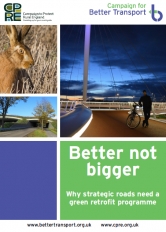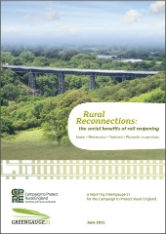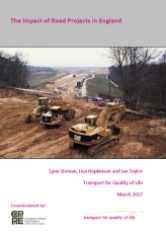Transport
Beautiful by design
A new aesthetic for the road network
This landmark speech was given in March 2015 by the Rt Hon John Hayes MP, when he was roads minister, to CPRE and the Campaign for Better Transport. It outlines a noble vision of greater harmony between our road network and our priceless countryside. This publication includes a foreword by Sir Andrew Motion, CPRE President, and an introduction from Colin Matthews, Chairmain of Highways England. More information about the speech is available in our features section.
Better not bigger
Why strategic roads need a green retrofit programme
This report, produced by CPRE and the Campaign for Better Transport, sets out aspirations for roads retrofitting programme, to reduce environmental impacts. Measures could include improved conditions for cycling and walking, plus restoring tranquillity by tackling noise and visual intrusion.
CPRE's Guide to Quiet Lanes
Following CPRE's successful campaigning, local authorities are able to designate country lanes as 'Quiet Lanes' in rural areas, under the Transport Act 2000. This accessible and informative guide will explain what Quiet Lanes are, their benefits and, step-by-step, how to promote them in your area.
CPRE's response to Major Roads Network Consultation
CPRE's response to the consultation on proposals to create a major network. The response was to a report titled: ‘Creation of a Major Road Network: Moving Britain Ahead’. We set out a summary of our approach to the proposals and how we feel they could be improved for the benefit of the English countryside
National Infrastructure Commission
The Government consulted on "the proposed governance, structure and operation of the National Infrastructure Commission". In this response, CPRE supports the creation of the Commission but calls for better processes for public engagement on infrastructure and for the Commission to be given an explicit environmental scope.
National Networks National Policy Statement
A CPRE briefing for the House of Commons designation debate
The National Networks National Policy Statement ('the NPS') is the first long-term planning document for the Strategic Road Network, railways and Rail Freight Interchanges. We welcome the creation of this NPS, which was originally due to be finalised in 2010, because putting planning policy for major road and rail schemes into one document makes the planning system more efficient and accessible.
Unfortunately the content of the NPS remains of concern and, although there have been a number of changes, these are unlikely to mean many differences in practice to the draft NPS that was published in December 2013.
Our briefing outlines CPRE's priorities for lobbying on this important planning document.
Rural Reconnections
The social benefits of rail reopening
The cost of reinstating railway lines to modern standards can be significant. This is therefore only likely to happen where there is a compelling reason to do so. But with the demand for rail growing year on year, investment in rail capacity between and within our major cities is proving essential. So this report asks – by way of a case study – whether it is now time to consider whether railways in rural areas should be expanded, too.
The Campaign to Protect Rural England (CPRE) commissioned Greengauge 21 to examine the wider impacts of reopening the Plymouth – Tavistock – Okehampton – Exeter railway, as a second main line for Devon and Cornwall. Until now, the investment case has been driven by a need to ensure that the South West is not cut off by severe weather and landslips on the existing line. The event driving the examination of this proposal was the lengthy closure of the line after sea damaged the railway line at Dawlish in February 2014.
So far, little consideration has been given to how a second line could better serve the rural area through which it passes. This report considers these local economic and social impacts of such a move.
The end of the road? Challenging the road-building consensus
Watch our animation summarising the report and download below:
This CPRE report reveals that road-building is failing to provide the congestion relief and economic boost promised, while devastating the environment. It directly challenges government claims that ‘the economic gains from road investment are beyond doubt’; that road-building will lead to ‘mile a minute’ journeys; and that the impact on the environment will be limited ‘as far as possible’. The report shows how road building over the past two decades has repeatedly failed to live up to similar aims.
The report is based on a study commissioned by CPRE and carried out by consultants Transport for Quality of Life (TfQL), which examined 86 official studies of completed road schemes. The TfQL research is available here.
The Impact of Road Projects in England
CPRE commissioned consultants Transport for Quality of Life Community Interest Company (TfLQ) to examines the impacts of road schemes on traffic, the environment, the economy, road safety and land use.
This study draws upon evidence of short-term impacts (between one and five years after scheme completion) from over 80 road schemes, published by Highways England1 through its Post-Opening Project Evaluation (POPE) process. This is supplemented by long-term evidence from four road schemes that were completed between 13 and 20 years ago: the A34 Newbury Bypass, M65 Blackburn Southern Bypass, A46 Newark – Lincoln dualling and A120 Stansted to Braintree dualling.
CPRE's summary report, The End of the Road?, is available here.







